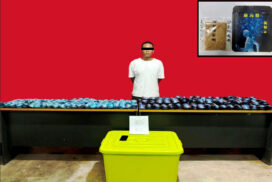By Yin Nwe Ko
Almost all of us have known that “Unless the teacher shows, the work is not methodical.” Many people might think boiling the water is just a trifle. However, in practical work, a guide or a teacher is quite essential. Once, one of my intimate friends who is a senior engineer told me that he often said to his workers to do the work as he instructed because they could only be able to do the work but they did not know the theory. He had been a student at an engineering institute and so he had studied a lot of theories of engineering subjects. After he went back to his house, I thought his words were perfectly right, and in every work, a good guide or a good teacher is essential.
There are as many ideas about how to best boil water as there are about how to cure hiccups. Some people say you must use cold water, explaining that hot water sits in the pipes, daring bacteria to inoculate it; others say to use hot, arguing that only a fool wouldn’t get a head start. Debates rage as to whether olive oil added to water serves any purpose (it only does if you are planning to serve the water as soup, which you may, but it makes sense to wait to add the oil until you decide).
Potatoes should be started in cold water, as should eggs. But sometimes I find myself distractedly adding them to water that’s already boiling, and both turn out fine. Green and leafy vegetables should be dropped into a bubble as big as your fist at the last second. Pasta, similarly, should only be added when a pot is rollicking and stirred once or twice. Ecclesiastical writers on the subject point out that in the beginning there was water, all life proceeded from water, there was water in Eden, water when we fell, then the slate got cleaned with it. Water breaks, and out we come.
As far as I can tell, the point is that water has been at it, oblivious to our observations, for longer than we know. I recommend heating a great deal of it, covered if you’re in a rush because it will boil faster that way, or uncovered if you need time to figure out what you want to boil. As long as it’s a big pot and the water in it gets hot, whichever technique you choose and however you time your addition of ingredients, the world — which began with some assessments with a lot of water at a rolling boil — will not come to an end.
Julia Child, an American cooking teacher, author, and television personality, instructs tasting water periodically as it climbs toward 212 degrees to get used to its temperature at each stage. Her advice might be overzealous, but it teaches an invaluable lesson, not about boiling, but about learning to cook: if there is anything that you can learn from what is happening, learn it. You don’t need to know how the properties of water differ at 100 degrees and at 180, but by tasting it at those temperatures you may learn something about your pot, your stove, or the spoon you like best for tasting.
Once your water reaches a boil, salt it well. The best comparison I can make is too pleasant seawater. The water needs to be this salty whether it’s going to have pasta cooked in it or the most tender spring peas. It must be salted until it tastes good because what you’re doing isn’t just boiling an ingredient but cooking one thing that tastes good in another, which requires that they both taste like something. All ingredients need salt. The noodle or tender spring pea would be narcissistic to imagine it already contained within its cell walls all the perfection it would ever need. We too seem to fear that we are failures at being tender and springy if we need to be seasoned. It’s not so; it doesn’t reflect badly on the pea or person that either needs help to be most itself.
Add salt by hand so that you start to get a feel for how much savouring takes, and as you do, taste the water repeatedly. This may at first feel ridiculous, and then it will start to seem so useful you’ll stand by the pot feeling quite ingenious. Even though the water is boiling, you can test it with your finger. If it’s well seasoned, just tapping the surface will leave enough on your skin for you to taste.
When you find yourself tasting your water, you are doing the most important thing you ever can as a cook: the only way to make anything you’re cooking taste good, whether it’s water or something more substantial, is to make sure all its parts taste good along the way. There are moments in cooking when common sense dictates not to taste — biting into a dirty beet or raw potato — but do taste anything else from a few minutes after you start cooking it until it’s done. You don’t need to know what it’s supposed to taste like; what anything is supposed to taste like, at any point in its cooking, is good. This is as true for water as for other ingredients.
Almost all people get used to drinking normal (cold) water. Some people who own refrigerators can have colder water. Those people do not like the taste of normal water as the tastes of the two kinds of water; one is normal and the other is refrigerated; are rather different. We have to admit and accept that the taste of refrigerated water makes one good. In almost urban houses, people can afford to buy a refrigerator and put water and other foodstuffs in it. Therefore, those people have never heard that drinking hot water offers uncountable benefits to human beings. As for me, I was amazed when I first knew about it. However, when one of my friends who always drink hot water told me about his health status after practising the habit of drinking hot water for three months, I gradually realized it. The followings are the benefits that my friend has explained to me recently.
o Having Better Digestion
o Relieving Achalasia
o Breathing Better
o Making One Calm
o Reducing Pain
o Hydrating
o Helping In Losing Weight
o Preventing Premature Aging by Elimination of Toxins
o Decreasing Stress Levels
Be careful of one thing!
He recommends you start drinking a cup of hot water every morning in the beginning, when you start to get used to doing it and start also drinking one at night. If you don’t like the taste of water, you can also drink it with tea and get all the benefits of polyphenols or coffee.
It is true that drinking hot water has benefits for your health, but you must be careful when drinking it. If the water is too hot it can lead to severe damage to the oesophagus and taste buds and scald the tongue. It is important to check the temperature before drinking.
Besides, if you live in a hot country or are going to exercise or go through intense physical effort you should not drink hot water since it makes you less thirsty although you need more water, leading to a bigger risk of dehydration.
If you are having any frequent medication talk to your doctor to be sure that drinking hot water will not interfere with the medication effects. May everyone grasp the health benefits as their own.
Reference: Reader’s Digest Jan 2023














